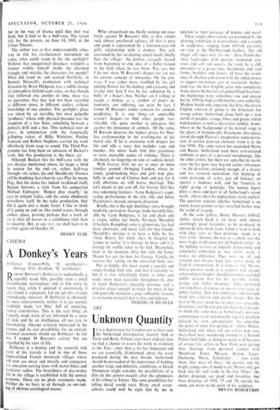CINEMA
A Donkey's Years
Balthazar. (Cameo-Poly, 'A' certificate.)— Georgy Girl. (Carlton, 'X' certificate.) ROBERT BRESSON's Balthazar is undoubtedly a superbly made film, possibly even a small misanthropic masterpiece, and so I'm sorry to report that, while I admired it enormously, I also found it repugnant. Let me get this straight immediately, however. If Balthazar is obviously no mere entertainment, neither is it yet another modishly made 'art film,' full of annoying, tricksy cine-devices. This is the real thing, an honestly made work of art, informed by a sense of style and by an intelligence all too rare in film-making. Anyone seriously interested in the cinema and its real possibilities for an entirely personal statement should see Balthazar. As for me, I respect M Bresson's artistry but am appalled by his view of life.
Balthazar is a donkey and the austerely told story of his travails is laid in one of those impoverished French mountain villages where old men are mean and miserly and youngsters are sensation-seeking louts with motor-bikes and transistor radios. The brutishness of day-to-day life in the village is established with the utmost economy. There are no plain statements made. Neither do we have to sit through an unwind- ing of obvious sociological scenes. What antagonised me, finally turning me reso- lutely against M Bresson's film, is that amidst such almost unrelieved ugliness all that is pure and good is represented by a fourteen-year-old girl's relationship with a donkey. The girl, coarsened by her awakening sexual needs, finally flees the village: the donkey, savagely treated from beginning to end, dies of a bullet wound in the field where he was born. Yes, yes, but 1 do not share M Bresson's disgust for sex nor his curious concept of innocence. On the con- trary. I was rather more troubled by the girl picking flowers for the donkey and caressing and kissing him than I was by her seduction by a bully of a baker's boy. Neither am I willing to accept a donkey as a symbol of man's in- humanity, our suffering, our pain. In fact, I found M Bresson's tender concern for animals perplexing. It is one thing—an admissible season's despair—to find other people irre- trievably vile, quite another to juxtapose this against the innocence of animals. All the same, M Bresson deserves the highest praise for flaw- less craftsmanship in the working-out of his moral tale. If he is overcome with disgust for life and tells a story that includes rape and murder, this never leads him into gratuitous or even excusable scenes of violence. There is absolutely no lingering on sexy or sadistic detail.
With Georgy Girl, we are at once on more familiar ground—Swinging London, where in- touch, good-looking boys and girls hop glee- fully in and out of Chelsea beds and pay for it with abortions or, still worse, marriage. This isn't meant to put you off, for Georgy Girl has two redeeming features: Lynn Redgrave's capti- vating performance in the title role and Silvio Narizzano's shrewd, energetic direction.
Briefly, this is the ugly duckling's story brought modishly up-to-date. Georgy, made instantly like- able by Lynn Redgrave, is fat and plain and a virgin, unlike her bitchy flat-mate Meredith (Charlotte Rampling), who is glamorous, has had three abortions, and never fails for boy-friends. Meredith's mistake is to have a baby by Jos (Alan Bates), for while she's in hospital he `comes to realise' it is Georgy he loves and it is Georgy he swiftly takes to his bed. Meanwhile, back at the mansion, dirty but rich old James Mason has got the hots for Georgy. Finally, he marries her taking on the unwanted baby too.
Put so baldly, this must sound a squalid and empty-headed little tale, and that it certainly is; but it is also refreshingly funny at times and made more than palatable throughout by dint of Lynn Redgrave's engaging presence and a director clever enough to make the most of her and generally maintain a pace sufficently frenetic to overcome material that is thin and dubious.
MORDECAI RICHLER


































 Previous page
Previous page